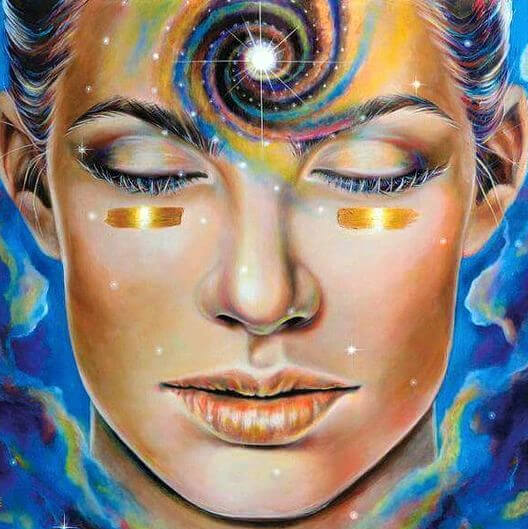Have you ever had an epiphany? Did the proverbial lightbulb in our head turn on so that you could suddenly understand something profound? The definition of epiphany is: a divine manifestation, appearance or revelation. The pineal gland also happens to be known as conarium or ‘epiphysis’ cerebri. The prefix ‘epi’ means outside, extra or supra and the word ‘physis’ relates to the physical, with ‘cerebri’ meaning ‘of the brain’. Let’s explore this fascinating lightbulb a little more.

The pineal gland sits in the centre of the brain, exactly between the left and right brain hemispheres in line with the eyes and behind the hypothalamus and pituitary glands. It forms part of the neuro-endocrine system and runs our biological clock (circadian rhythm). It is responsible for the diurnal day-night wake-sleep cycle, as well as the speed of our ageing, health and wellness.
As master regulator of the neuro-endocrine system, the pineal gland is responsible for signalling of hormone release from the pituitary gland. The pituitary in turn signals the rest of the endocrine system to produce and release hormones.
This mysterious gland is the size of a small bean and in the shape of a pine cone, which follows the sacred geometry Fibonacci sequence. It is just one tiny gland, whereas other organs and glands are divided into two hemispheres or parts. They are binary, but the pineal gland is a single unit: One central component linking the body’s networks like a bulls’eye’ or zero point.

The pineal gland produces melatonin at night during deep sleep, which works as a potent neuro-protective antioxidant that helps to detox the cerebrospinal fluid of the brain. It has even been shown to have anti-viral effects. When we don’t get a restful deep sleep, which produces enough melatonin, we wake up with leftover pollution and waste products in the brain. Waking up and feeling like you haven’t slept at all is torture.
The third eye and ‘lamp of the body’
There is a lot more to the pineal gland than meets the ‘eye’.
It has been referred to traditionally as ‘the third eye’ (after the first two eyes on the outside of our head), which acts as the eye responsible for ‘inner sight’ or ‘insight’. In other words, intuition. The pinealocytes (pineal cells) are even structurally similar to the retinal cones, neurones and neuroglia of the first two eyes. (1)


Scientists have deduced that the pineal gland, in conjunction with the Suprachiasmatic Nuclei of the hypothalamus, works like a device that receives and transmits frequency information in relation to our position on the planet as it rotates around itself, and seasonally in its movement around the sun. In a way it’s like a biological GPS device.
Our sixth sense (gut feel), ability to intuit and inner spiritual ‘compass’ are dependent on the health of the pineal gland.
Jesus is said to have referred to ‘the eye’ as the lamp of the body that accesses spiritual knowing, or sees things clearly and in truth. “The light of the body is the eye: therefore when thine eye is single, thy whole body also is full of light; but when thine eye is evil, thy body also is full of darkness.” Luke 11:34-36 The ‘evil’ refers I believe to corruption of the ‘eye’, which means the body becomes more polluted (dark) and sick until it blocks spiritual insight.
In the Book of Revelation, those with the sign of the beast on their forehead were deemed to have a closed-down pineal gland (eye), meaning spiritual death.

In the 1600s, Rene Descartes called the pineal gland ‘the seat of the soul‘. The Romans proclaimed the pineal gland to be the supreme gland. In Hinduism, the pineal is referred to as the Eye of Shiva; in Buddhism, it is the Eye of Wisdom and Compassion; and in Egyptian culture, the pineal gland is known as the Eye of Osiris, Eye of Horus, and Eye of Ra.
To add to the mystique, the pineal gland not only produces melatonin to detox the brain during sleep, but it also produces traces of DMT (dimethyltryptamine), which is a psychedelic. It produces feelings of euphoria, love and consciousness expansion or deep insight. This molecule is released at significant times of life such as at birth, at the end of life and in near-death-experiences. It is also produced during vivid dream states and advanced meditation practices.
Sleep deprivation is a killer
We need to be resting to be restored, as well as to digest food. This is called the parasympathetic state of ‘rest and digest’, or the opposite of the sympathetic state of ‘fight or flight’. You can’t have the engine running on full capacity during that cleaning and maintenance process. When people suffer chronic sleep deprivation they get very sick because the garbage wastes start to pile up.
Sleep disorders are associated with the epidemic of obesity. In obese people the pineal gland is usually significantly smaller than that of lean people. The smaller size of the pineal gland is correlated with dysregulation in the production of melatonin, our sleep hormone.1

The Centre for Disease Control (CDC) reports that about 70 million Americans suffer from chronic sleep problems, which are generally associated with obesity, diabetes, hypertension and increased cardiovascular risk. Other co-morbidities include: dementias, chronic pain, mental illness and gastro-intestinal disorders.
People with Schizophrenia OR Major Depressive Disorder also tend to have a smaller sized pineal gland. Depression commonly occurs as a symptom of PTSD, triggered by a trauma or chronic stress. Chronic stress and PTSD is associated with magnesium deficiency, as stress and trauma causes excessive magnesium loss. People with depression suffer excessively from sleep disorders, lack of melatonin, and consequent headaches, inflammation and metabolic syndrome (also connected to hypothyroidism).
Unfortunately, the pineal gland has the highest calcification rate among all organs and tissues of the human body. The more your pineal gland becomes calcified, the more it hardens and shrinks, and the less melatonin sleep hormone it can produce.
Pineal calcification generally increases with age, and is a marker for premature ageing and degeneration. When we are children, the pineal gland is pliable like a ligament, hydrated and juicy. Due to the presence of liquid crystals, it has piezoelectric properties and can vibrate in response to frequency. “When a mechanical drive is applied to these crystals, a minute electrical pulse is generated, particularly in the matrix of the connective tissue, which becomes harmonic and oscillating. The information is transmitted electrically through the connective tissue (Oschman 2003).”
As we get older, it shrinks, hardens and stiffens. However, you can slow down this ageing process by looking after your pineal gland via good nutrition, magnesium supplementation and lifestyle practices, including sunshine and oxygenating exercise. In other words, have some fun swimming at the beach!
Metabolic syndrome and weight gain
Free floating anxiety or pain conditions, associated with the sympathetic state of ‘fight or flight’, keep adrenalin high. This blocks deep sleep and prevents melatonin production.
Deep sleep is the time where the brain does its housekeeping after all the metabolism and energy spent during the day, which produces free radical waste by-products. It is also the time where tissue cells get serviced and replaced – in other words, when healing mostly happens.
At night cortisol levels should drop for sleeping deeply, and rev up again in the morning when we need to get up and ready for action. However, when the stress hormones are high in the circulation, and the cortisol keeps stimulating the nervous system, it can’t relax enough to induce melatonin cycle in the pineal gland. When there is not enough melatonin, there is not enough detoxification of the neuro-endocrine system. The cortisol also grabs hold of glucose and insulin to deliver to cells for energy, but at night we don’t use that much energy, so what we don’t use tends to be stored as extra fat.

This becomes a vicious cycle because the less sleep, the more stress, and the more we suffer from excessive magnesium loss, which then increases sensitivity to stress until we fall apart at the slightest provocation. Little issues become big issues. The adrenals can get overloaded by the constant stress hormone production, until it affects metabolism and chronic fatigue sets in.
There is a frustration that comes from feeling wired (agitated and ready to run), but too tired to answer the call to action. The ‘wired’ part is the stress hormone cascade triggering excessive cortisol, but crashing into fatigue and weight gain. There’s nowhere to go with that fuel because metabolism is on vacation, so it gets parked in extra fat cells.
To add insult to injury, the extra fat cells produce too much oestrogen and can put us in oestrogen overload (especially if also exposed to other estrogen-mimicking chemicals). Estrogenic conditions cause unstable emotions and fragility, foggy brain, and more fatigue. In this state we tend to shrink back and feel sorry for ourselves, taking everything personally, and lacking the confidence and motivation to fix our problems.
Stress and digestion
When we feel stress and anxiety the body’s resources are channelled towards the muscles (so you are ready for action), and away from the stomach and digestive system. Your body gets back to the work of digestion and detoxification during the parasympathetic mode of ‘rest and digest’.
The vagus nerve is the largest nerve in the body and runs down the front along the digestive tract. It is influential in managing the switching between sympathetic and parasympathetic mode and works closely with the Hypothalamic-Pituitary-Adrenal (HPA) axis, which produces hormones for signalling throughout the nervous system. Under stress the vagus nerve automatically tightens and restricts the digestive tract. The pineal gland sits at the top of this chain of command to regulate neuro-endocrine responses, dependent on environmental stimuli.
Gut microbiome and digestion problems (usually from a lot of stress) contribute to metabolic syndrome. Not only does the slow transit of food and sluggish elimination cause a backup in wastes which start to putrefy, but when we can’t digest and break down food properly due to low stomach acid, we can’t extract and absorb the nutrients we need, such as magnesium. This dampens down the production of electrical energy for enervating our neuro-endocrine system to produce the hormones and antioxidants we need – like glutathione, superoxide dismutase and melatonin. This compromises detoxification.

It can also have a side effect of Small Intestinal Bacterial Overgrowth (SIBO), which causes a lot of bloating, excessive gas and reflux due to the attraction of bacteria to the food scraps. Pathogens that produce more acids also move in downstream as the environment of the intestine becomes too acidic. The excessive acids can eat holes in your intestinal mucosal linings, allowing toxins to be re-absorbed. This condition is called ‘leaky gut syndrome’, which causes even more stress and feelings of anxiety.
Before you know it, you find yourself tossing and turning night after night with deep sleep elusive, and your brain not switching off because the adrenalin and cortisol stress hormones can’t subside. Lack of deep sleep means lack of melatonin, which results in a pile up of metabolic wastes. The next day you get toxic headaches and brain fog, feeling fatigued and depressed.
The pineal gland needs light and dark cycling
The pineal gland is fed by full spectrum daytime light photons. After they pass through the optic nerves of the first two eyes, the light triggers the Suprachiasmatic Nuclei to cause tryptophan to be converted to serotonin, which is made into melatonin during night time deep sleep. Scientists have found that even fully blind people can have their pineal gland stimulated by sunlight to make serotonin and melatonin. The light still gets through.


Melatonin is best produced at night between the hours of 12 midnight and 4am in the most darkened environment. Don’t go to bed after midnight because you miss the right window to enter the proper deep sleep cycling, and your sleep may remain too light or restless for the rest of the night.
The pineal gland needs darkness, quiet, and the least amount of stimulation, including electro-magnetic activity. Avoid sleeping next to a plugged-in electrical appliance, and don’t expose your eyeballs to computer screens or TV during the couple of hours before sleep time. The LED light is very stimulating. Before bed dim down your environment to low warm light (as in incandescent globes or candles), and try meditation or listening to relaxing music. Some people like to pick up a book and read for a while to fall asleep – the old fashioned way! For best sleep conditions draw the curtains and blinds to ensure it’s very dark, so that not even moonlight gets through.
Antioxidant power to neutralise free radicals
In addition to detoxification, melatonin has another important job: It also activates the pituitary gland to release Melanocyte Stimulating Hormone, and it’s the melanocytes that produce melanin. Melanin is another powerful antioxidant that is very dark and can absorb all parts of the light spectrum. It helps neutralise free radicals produced from radiation exposures (sun), as well as metabolic wastes. It is produced not only in the skin to give you a nice tan and protect the skin barrier, but is also found in all the organs, including the brain. In general, it is found in highest quantity wherever there is a lot of mitochondrial activity because this antioxidant is a powerful neutraliser of free radicals produced by metabolism.

Melatonin is not only produced by the pineal gland, but recent studies have shown that, like melanin, it is produced everywhere in the body where there are mitochondria producing electrical energy (oxidative phosphorylation), which then leaves behind metabolic wastes that need to be neutralised and cleared out. This extra-pineal melatonin can be produced during daylight hours and is not dependent (like the pineal gland is) on deep sleep cycles, to make melatonin.
This particular melatonin production occurs in all the other organs – and especially the tissue cells of the gut lining where there is a lot of mitochondrial metabolism going on. So, if you have digestive disorders and a compromised gut lining, your melatonin antioxidant production will also be depressed.
Interestingly, the total melatonin production outside the pineal gland adds up to more melatonin produced than in the pineal gland, but only the pineal gland is involved with circadian rhythm regulation and detoxification of the cerebral spinal fluid. Pineal melatonin is just for the brain.
Serotonin should subside as darkness increases
Serotonin is a daytime hormone that generally makes us feel satisfied, motivated, positive, energetic and happy. Serotonin’s presence is associated with adrenalin and cortisol (stress hormones), which provide action potential so we can work and exercise. At night time the serotonin you accumulated during the day subsides, and via enzymes, is converted to melatonin during the deep sleep cycle.

You need enough magnesium for mitochondria to produce the electrical energy that drives enzymes to make melatonin. Magnesium also dampens the effect of the stress hormones, controls the calcium channels, and so relaxes the muscles and nervous system – ready for sleep.
Studies have shown that melatonin has an effect on serotonin levels. If you can’t make enough melatonin to use up serotonin, and your serotonin piles up, it can cause serotonin syndrome, whereby serotonin becomes oxidised and neuro-toxic. It shouldn’t hang around too long and ‘go off’.
Toxic levels of serotonin are associated with more stress responses, excessive adrenalin, higher estrogen levels, hypothyroidism and dysregulated HPA axis function – which are all associated with magnesium deficiency!
Tryptophan, herbal teas, and magnesium soaks and massage
Tryptophan, or L-tryptophan, is one of the nine essential amino acids, an important building block of protein. Your body can’t make it on its own, so you need to get it from food. Tryptophan is converted to niacin, a B vitamin necessary in metabolism.
You also need tryptophan to make serotonin. The foods with high tryptophan tend to be high in protein too, so if you have digestion problems, make sure you also use natural digestive aids to support your stomach digestion and gut health.

The tryptophan in foods can make us feel sleepy. This is why cultures have traditionally used warm milk as a supper time drink to relax the body. I recommend organic full cream unprocessed dairy milk (if you are okay with digesting the lactose), and add a touch of honey and cinnamon. Nutmilks can be used as a substitute.


Remember to use topical magnesium massage, or a magnesium bath or footsoak, to compensate for the extra calcium in the milk, as these two minerals compete. This should prepare the way nicely for a relaxing deep sleep.
Herbal teas like chamomile, valerian root, peppermint, ashwagandha, holy basil, St John’s wort, wild lettuce, hops, lavender, lemon balm, passionflower and magnolia bark have been used traditionally as sleep promoting teas before bed time. It’s interesting to note that these teas also support better digestion by calming the vagus nerve and neutralising acids, so they help to relieve reflux too. The bonus is that there are little to no calories in herbal teas.
Eat light: eat right
The most important thing to do is to eat an alkalising diet, which means a lot of fresh antioxidant vegetables, avoiding ‘dead’ processed foods and chemicals. Avoid sugar and processed grains like white flour (eg bread and noodles). Avoid thickened sauces, fried foods and chemical additives like monosodium glutamate (MSG). Don’t have stimulants like caffeine after midday or evening so as not to overstimulate the nervous system.
Beware of fluoride

Beware of fluoride ingestion, the most common vector being via tap water or its derivatives. Fluoride binds calcium and deposits in tissue, such as endothelial linings, bone and the pineal gland. Fluoride also robs your magnesium. Studies published by Luke et al showed significantly higher levels of fluoride deposited in the calcified pineal glands than in the bone.
The pineal gland is particularly vulnerable to fluoride toxicity because it sits outside the blood-brain barrier, bathed in a very high vascular blood supply second only to the kidneys. The fluoride is attracted to calcium and both accumulate in the pinealocytes, stiffening the tissue. The more rigid the pineal gland becomes, the less flexible it is, which affects its piezoelectric capacity, and therefore the less able it is to sense subtle frequencies. We need magnesium for muscles and ligaments to relax and flex, and to control the calcium and fluoride which make tissue cells rigid.
It’s interesting to note that children in fluoridated areas who are exposed to fluoride early in life experience a delay in the eruption of their second teeth. However, they tend to go into puberty earlier than their counterparts in non-fluoridated areas. These developmental milestones are body clock rhythms that become disrupted when the pineal gland’s function is affected by environmental chemicals or stressful conditions.
Melatonin supplementation

Melatonin is not considered addictive, nor does it have the negative side effects of drugs like benzodiazepine or sleeping tablets.
It can be useful after air travel through different time zones to help re-adjust the body clock, and to neutralise toxins produced from the stresses of sleep deprivation. Doctors recommend its use normally to help adjust body clock sleep cycles after some kind of disruption, such as air travel or shift work. For healthy people, regular ongoing use is discouraged so as to avoid reduction of the body’s endogenous melatonin production. However, several recent studies have used longer term melatonin supplementation for its antioxidant capacity in helping to neutralise free radicals in those with infections like Ebola (2), or even to buffer the acid wastes of cancer treatment (3). Scientists are recommending that future research should be done to investigate the benefits of melatonin treatment for those with metabolic syndrome and diabetes (2), as this group commonly suffers from chronic sleep problems. In this case the metabolism issues cause disruption in pH balancing, as well as excessive cortisol at night, which interferes with endogenous melatonin production.
Say a prayer

Letting go and giving yourself over to sleep also requires trust. You can’t afford to be on alert and in control during this time or you won’t be able to move into the parasympathetic calm state for sleeping. The sleep-promoting rituals listed above are very important, but so is a little prayer for your guardian angels to look over you while you surrender to sleep, your inner ‘maintenance time’ and perhaps a peak into other dimensions.
You need to be able to, ‘let go and let God’ so you can harness the power of your pineal gland to receive important messages that impact your life, survival, as well as emotional and spiritual wellness. Practice this ritual every night and have faith that you will be safe and nurtured. Take note also of your dreams, which can be a way your subconscious conveys messages (albeit in a cryptic way). You get better at it over time, so be persistent.
By Sandy Sanderson © 2021
Reference:
(1) Tan, D. X.; Xu, B.; Zhou, X.; Reiter, R. J. Pineal Calcification, Melatonin Production, Aging, Associated Health Consequences and Rejuvenation of the Pineal Gland. Molecules 2018, 23 (2), 301. https://doi.org/10.3390/molecules23020301.
(2) Masters, A.; Pandi-Perumal, S. R.; Seixas, A.; Girardin, J.-L.; McFarlane, S. I. Melatonin, the Hormone of Darkness: From Sleep Promotion to Ebola Treatment. Brain Disord Ther 2014, 4 (1), 1000151. https://doi.org/10.4172/2168-975X.1000151.
(3) Li, Y.; Li, S.; Zhou, Y.; Meng, X.; Zhang, J.-J.; Xu, D.-P.; Li, H.-B. Melatonin for the Prevention and Treatment of Cancer. Oncotarget 2017, 8 (24), 39896–39921. https://doi.org/10.18632/oncotarget.16379.

